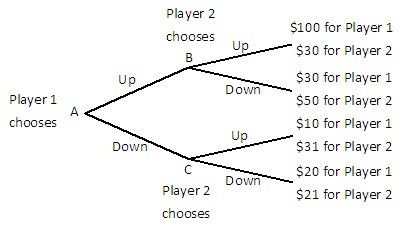Player 1 and Player 2 are playing a game in which Player 1 has the first move at A in the decision tree shown below. Once Player 1 has chosen either Up or Down, Player 2, who can see what Player 1 has chosen, must choose Up or Down at B or C. Both players know the payoffs at the end of each branch.  Suppose Player 1 and Player 2 enter into a binding agreement in which Player 1 agrees to pay Player 2 a fixed amount of money to get Player 2 to play Up when it is Player 2's turn. How much will Player 1 have to pay Player 2 to get Player 2 to play Up?
Suppose Player 1 and Player 2 enter into a binding agreement in which Player 1 agrees to pay Player 2 a fixed amount of money to get Player 2 to play Up when it is Player 2's turn. How much will Player 1 have to pay Player 2 to get Player 2 to play Up?
A. at least $20.
B. at least $50.
C. at least $10.
D. $0
Answer: A
Economics
You might also like to view...
If the average price level in 1991 was 1.20 relative to the base year in 1986, then a dollar in 1991 bought 20 percent more goods and services than a dollar in 1986
a. True b. False Indicate whether the statement is true or false
Economics
Which of the following changes would not shift the demand curve for a good or service?
a. a change in income b. a change in the price of the good or service c. a change in expectations about the future price of the good or service d. a change in the price of a related good or service
Economics